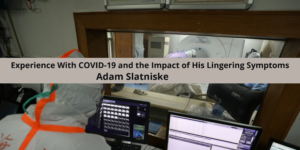Adam Slatniske Discusses His Experience With COVID-19 and the Impact of His Lingering Symptoms


In late April of 2020, the CDC added “loss of taste and/or smell” to their ever-growing list of COVID-19 symptoms. While the loss of one – or two! – of the five senses is alarming for patients, most of them regained their sense of taste and smell within a few weeks. Other patients, like Adam Slatniske, haven’t been as lucky, and have been dealing with a loss of taste and smell for months after contracting the novel coronavirus. Slatniske says dealing with the loss of taste and smell has affected him in more ways than he could have imagined.
It’s Depressing Not to Taste or Smell Your Food Says Adam Slatniske
Since catching COVID-19 before Christmas of 2020, Adam Slatniske has not been able to smell or taste anything he’s eating. That means it’s much more about texture than anything else now.
“The very thin silver lining to not having a sense of taste or smell is that I’ve lost about ten pounds. I don’t eat pizza, chips, or other junk food because I don’t enjoy them as much,” says Adam Slatniske. But that silver lining doesn’t make up for not being able to savor his favorite meals anymore. It’s more depressing than he would have assumed, he tells us.
And this symptom is more than psychological. Dr. Pamela Dalton, a well-known chemosensory scientist and member of the Monell Chemical Senses Center in Philadelphia, says that because the sense of smell and taste are so closely tied with memory and pleasure, losing those senses can trigger negative emotions caused by less serotonin stimulation in the brain. Serotonin contributes to our feelings of happiness and overall well-being.
“So, what they’re feeling is not just psychological,” said Dr. Dalton to the Journal of recovering COVID patients.
It’s Affecting My Social Life Says Adam Slatniske
When he first lost his sense of taste and smell, Adam Slatniske assumed that, like most COVID-19 patients, it would come back. While it was frustrating not to be able to taste food, what he didn’t expect was how much it would affect his everyday social life.
“Suddenly I was anxious about things I never had to think about before,” says Adam Slatniske. He says that not being able to check his breath makes him paranoid that he’ll bother people with halitosis. “It has actually led to my talking to people less – I’m afraid my breath will be terrible, and they’ll be too polite to tell me!”
The same goes for B.O. “I’m constantly wondering if I remembered to put on deodorant when I’m out,” says Adam Slatniske.
Adam Slatniske is a dentist in Maryland, where he lives surrounded by his close friends and family. He is also a dedicated public servant and community member.
